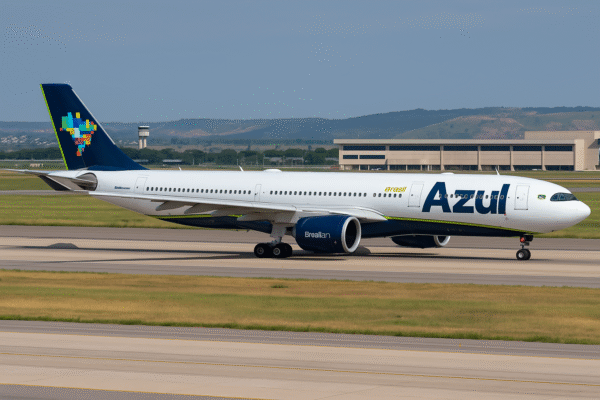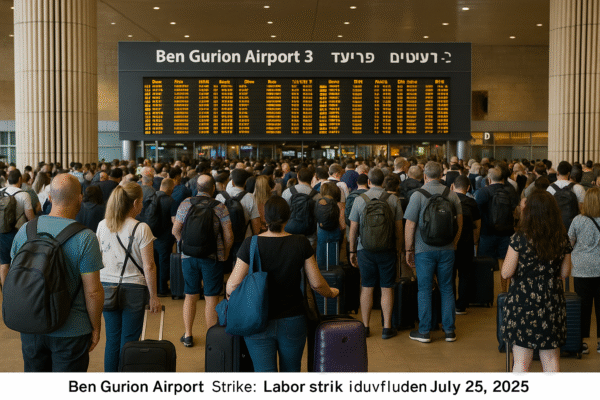TEL AVIV, ISRAEL – Travelers at Ben Gurion Airport were met with significant delays on Friday, July 25, 2025, following a disruptive ground staff strike that upended operations at Israel’s busiest international airport. The industrial action came amid peak summer travel season, resulting in a chaotic scene that saw delayed departures, sluggish baggage handling, and growing passenger frustration.
The protest, described by insiders as a “go-slow” or “Italian strike,” involved ground crews performing only the bare minimum of their contractual duties. Although initially denied by the Israel Airports Authority (IAA), the slowdown severely affected aircraft turnaround times and disrupted the flow of operations throughout the day.
Labor Tensions Disrupt Air Travel in Israel
The strike’s root cause lies in unresolved tensions between airport staff and management. Ground service workers—including those responsible for baggage loading, ramp coordination, and aircraft dispatch—have voiced concerns for months over stagnant wages, increased workloads, and staffing shortages as flight volumes recover to near pre-pandemic levels.
While the IAA first blamed “heavy traffic congestion” for the day’s issues, multiple sources confirmed to local media that a coordinated labor protest was indeed underway. “This wasn’t just congestion—it was a calculated slowdown,” said one anonymous airport official. “We’re seeing employees following protocol to the letter, but deliberately slowing down the process.”
The IAA eventually acknowledged the disruption but stopped short of labeling it a strike. However, according to the Histadrut, Israel’s national trade union federation, there had been rising dissatisfaction among workers over deteriorating conditions, particularly with understaffing amid increased passenger flow this summer.
Passenger Frustration Mounts as Flights Back Up
Ben Gurion Airport processes tens of thousands of passengers daily, particularly during summer months when both outbound and inbound travel surge. The ground staff protest caused ripple effects throughout the airport: long check-in lines, congested security checkpoints, and gate delays. Some flights faced ground delays of over an hour, while others were rescheduled or canceled outright.
Affected passengers took to social media to share photos of overcrowded terminals and abandoned baggage trolleys. “This is a nightmare,” one traveler wrote on X (formerly Twitter). “We’ve been waiting 90 minutes and still haven’t checked our bags. No updates, no assistance.”
Tourism operators also raised concerns about the protest’s broader implications. According to the Israel Ministry of Tourism, international visitor numbers have rebounded in 2025, with Ben Gurion Airport serving as the key entry point. “Labor instability at this hub could damage our hard-won recovery,” said a Tel Aviv-based tour agency representative.
Widespread Labor Discontent in the Global Aviation Sector
Ben Gurion Airport’s disruption reflects a global trend. Airports from London to Frankfurt and Chicago to Rome have seen waves of protests and walkouts this year, as aviation workers advocate for improved conditions after years of pandemic-driven austerity.
In Israel’s case, ground staff reportedly feel overlooked as the country’s aviation sector prioritizes growth targets over workforce welfare. “We’re doing twice the work with fewer people and little recognition,” said a ground services technician who participated in the slowdown. “This protest was our only way to be heard.”
Analysts say the labor unrest points to deeper systemic problems. “Without proactive workforce planning and adequate compensation, these disruptions will only continue,” noted aviation labor expert Dr. Naomi Koren from the Hebrew University of Jerusalem.
Israel Airports Authority Faces Scrutiny
The Israel Airports Authority has faced criticism for its handling of the strike and its communications with the public. Critics argue that the IAA downplayed the severity of the issue, leaving travelers unprepared and causing confusion during already stressful travel periods.
A statement released late Friday by the IAA acknowledged “service irregularities” at Terminal 3 but avoided directly addressing the labor protest. Calls for the IAA to engage more transparently with unions and adopt contingency plans are growing.
Tourism advocacy groups have also urged the IAA and the Ministry of Transport and Road Safety to intervene, warning that such events may tarnish Israel’s reputation as a tourism-friendly destination.
What Travelers Should Do
Passengers with upcoming flights via Ben Gurion Airport are advised to take precautionary steps:
- Check flight status frequently via the official Ben Gurion Airport website (iaa.gov.il) or airline apps.
- Arrive at the airport earlier than usual, particularly for international flights.
- Pack light and consider carry-on options to bypass delayed baggage handling.
- Expect slower processing times, especially in check-in and baggage drop areas.
For real-time updates, travelers can follow the Israel Airports Authority’s official social media channels or subscribe to SMS notifications for flight changes.
Looking Ahead: Labor Talks on the Horizon?
In response to mounting public pressure, the IAA has agreed to meet with representatives from the ground staff union early next week. While the exact agenda remains confidential, wage concerns and staffing levels are expected to be at the forefront.
If no resolution is reached, further protests could occur—potentially even during the upcoming Jewish holiday travel period in September. The Histadrut has not ruled out a formal strike authorization vote if negotiations falter.
Conclusion: A Wake-Up Call for Israel’s Aviation Sector
The Ben Gurion Airport ground staff strike on July 25 has underscored how essential behind-the-scenes workers are to the functioning of air travel. As Israel’s main international gateway, the airport’s reliability is key to both tourism and business sectors.
Unless swift action is taken to address workers’ grievances, future disruptions could endanger not only flight schedules but also Israel’s hard-fought tourism recovery. For now, passengers are left navigating uncertainty—reminded that smooth journeys begin not just on the runway, but on the ground.
For more travel news like this, keep reading Global Travel Wire






















